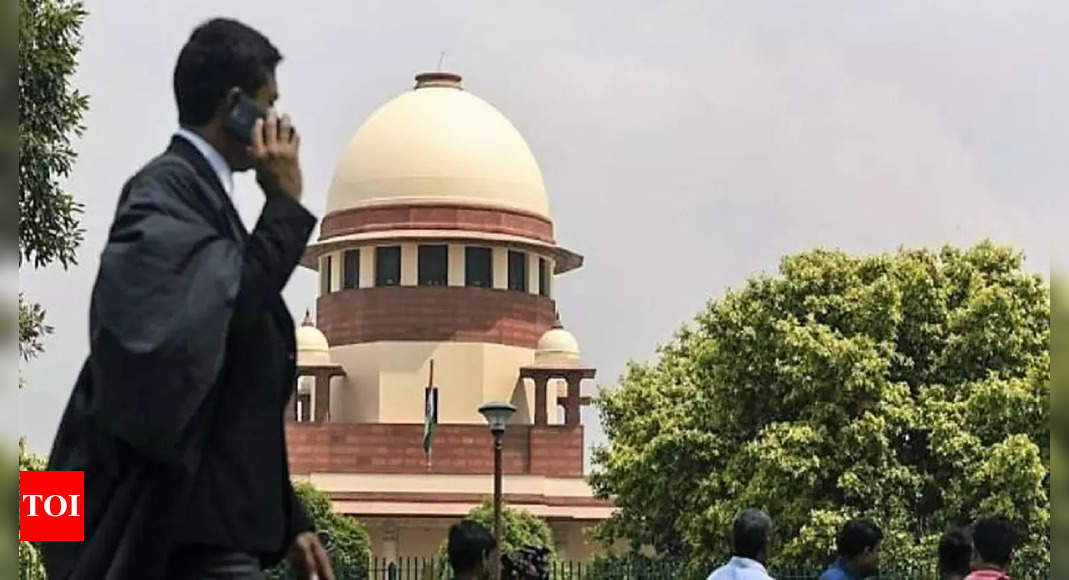[ad_1]
NEW DELHI: The Supreme Court has ruled that a member of the Scheduled Caste community cannot weaponise the SC and ST (Prevention of Atrocities) Act by bringing under the purview of this stringent penal law a purely civil dispute between him and a member of the upper caste community.
P Bhaktavatchalamwho belongs to the SC community, had constructed a house on a vacant plot. Subsequently, a temple came to be constructed adjacent to his plot by members of the upper caste community. The temple patrons had filed a complaint alleging that Bhaktavatchalam’s house violated building norms and had put up unauthorised constructions in the ground and first floors.
As a counter, Bhaktavatchalam filed a complaint under the SC & ST Act alleging that the temple was being constructed encroaching upon the common pathway and over the sewage and water pipelines to harass him and deprive him of peaceful enjoyment of his property only because he belonged to the SC community.
A magisterial court at Egmore, Chennai, summoned the accused persons who allegedly were in breach of several provisions of SC & ST Act. On appeal against issuance of summons, the Madras HC refused to give relief to the accused.
A Supreme Court bench of Justices M R Shah and Krishna Murari allowed the appeal, quashed the summons issued to the accused persons and said that a purely civil dispute is being attempted to be converted into a case under the SC & ST Act, which is an abuse of the process of law.
Writing the judgment, Justice Shah said, “It seems that the private civil dispute between the parties is converted into criminal proceedings. Initiation of the criminal proceedings for the offences under Sections 3(1)(v) and (v)(a) of the SC & ST (Prevention of Atrocities) Act, 1989. Therefore, this is nothing but an abuse of process of law and court.”
“From the material on record, we are satisfied that no case for the offences under the SC and the ST Act is made out, even prima facie. None of the ingredients of Sections 3(1)(v) and (v)(a) of the Act are made out. Therefore, we are of the firm view that in the facts and circumstances of the case, the HC ought to have quashed the criminal proceedings in exercise of powers under Section 482 of the Code of Criminal Procedure,” he said.
“The order passed by HC, is unsustainable and the same deserves to be quashed and set aside and criminal proceedings initiated against appellants deserves to be quashed and set aside,” the bench said.
P Bhaktavatchalamwho belongs to the SC community, had constructed a house on a vacant plot. Subsequently, a temple came to be constructed adjacent to his plot by members of the upper caste community. The temple patrons had filed a complaint alleging that Bhaktavatchalam’s house violated building norms and had put up unauthorised constructions in the ground and first floors.
As a counter, Bhaktavatchalam filed a complaint under the SC & ST Act alleging that the temple was being constructed encroaching upon the common pathway and over the sewage and water pipelines to harass him and deprive him of peaceful enjoyment of his property only because he belonged to the SC community.
A magisterial court at Egmore, Chennai, summoned the accused persons who allegedly were in breach of several provisions of SC & ST Act. On appeal against issuance of summons, the Madras HC refused to give relief to the accused.
A Supreme Court bench of Justices M R Shah and Krishna Murari allowed the appeal, quashed the summons issued to the accused persons and said that a purely civil dispute is being attempted to be converted into a case under the SC & ST Act, which is an abuse of the process of law.
Writing the judgment, Justice Shah said, “It seems that the private civil dispute between the parties is converted into criminal proceedings. Initiation of the criminal proceedings for the offences under Sections 3(1)(v) and (v)(a) of the SC & ST (Prevention of Atrocities) Act, 1989. Therefore, this is nothing but an abuse of process of law and court.”
“From the material on record, we are satisfied that no case for the offences under the SC and the ST Act is made out, even prima facie. None of the ingredients of Sections 3(1)(v) and (v)(a) of the Act are made out. Therefore, we are of the firm view that in the facts and circumstances of the case, the HC ought to have quashed the criminal proceedings in exercise of powers under Section 482 of the Code of Criminal Procedure,” he said.
“The order passed by HC, is unsustainable and the same deserves to be quashed and set aside and criminal proceedings initiated against appellants deserves to be quashed and set aside,” the bench said.
[ad_2]
Source link




